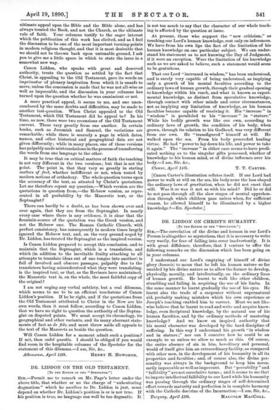DR. LIDDON ON CHRIST'S HUMANITY.
[To TIER EDITOR OF THE " SPECTATOR." J
Sin,—The correlation of the divine and human in our Lord's Person is altogether so mysterious, that it is necessary to write very warily, for fear of falling into error inadvertently. It is with great diffidence, therefore, that I venture to offer the following remarks on the discussion which has been going on in your columns.
I understand our Lord's emptying of himself of divine glory (kenosis) to mean that he left his human nature so far unaided by his divine nature as to allow the former to develop, physically, morally, and intellectually, on the ordinary lines of human growth. He learnt to walk like other children, stumbling and falling in acquiring the use of his limbs. In the same manner he learnt gradually the use of his eyes. He learnt also the trade of a carpenter without supernatural aid, probably making mistakes which his own experience or Joseph's teaching enabled him to correct. Must we not like- wise believe that he learnt to read and write and acquire know- ledge, even Scriptural knowledge, by the natural use of his human faculties, and by the ordinary methods of mastering knowledge? And we know on inspired authority that his moral character was developed by the hard discipline of suffering. In this way I understand his growth "in wisdom and in stature ;" nor can I conceive how he could be an example to us unless we allow so much as this. Of course, the entire absence of sin in him, hereditary and personal, would of itself give him an extraordinary facility, as compared with other men, in the development of his humanity in all its properties and faculties ; and, of course also, the divine per- sonality was always in the background to keep him neces- sarily impeccable as well as impeccant. But " peecability " and "fallibility" are not correlative terms ; and it seems to me that to impute intellectual fallibility to our Lord while his humanity was passing through the ordinary stages of self-determined effort towards maturity and perfection is in complete harmony with the Catholic doctrine of the Incarnation.—I am, Sir, &c.,


















































 Previous page
Previous page